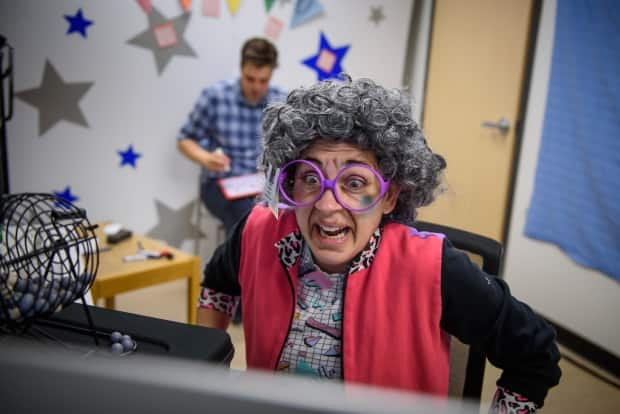Can clowns help in health-care? Circus fest brings therapeutic clowning to St. John's


Vanessa Furlong of Halifax knows some people find clowns scary and some find them funny — but her style of clowning is meant to have a different effect entirely.
Furlong is Atlantic Canada's only therapeutic clown — a designation that came with special training after she spent two decades as a performing clown. She taught a workshop about the art of therapeutic clowning this week as part of the St. John's International Circus Festival.
Therapeutic clowns often work in places like hospitals or long-term care facilities by bringing energy and humour while supporting expression and social interaction.
"It's about bringing the essence and presence that a clown can provide, while providing an avenue for finding joy within yourself if you're in a place like a hospital where joy is not the norm," Furlong said Wednesday.
"My goal is not to make someone happy. My goal is to just validate that person and their experience in that time."

Therapeutic clowning varies from traditional performance clowning in that it doesn't rely on jokes or gimmicks, Furlong said. It's about reading the room and empowering the person on the other end to make them the star of the show.
"That could be making a mess, it could be helping to maybe kick some nurses out of the room," she said. "It's about having that same clown essence, but it's about the patient that you are interacting with. It is their show."
Furlong said the clowning can evoke a wide range of emotions for both patients and the people around them.
"There's respite, there's empowerment, there's sometimes great belly laughter. There's even respite for staff, because it is a difficult place to work in, particularly in the last few years. So just having a little bit of the ridiculous in a place where ridiculous isn't always allowed, I see a bit of a change there."
Furlong said she wanted the workshop to introduce more people to therapeutic clowning, allowing it to flourish in a place where it's less prevalent than elsewhere in Canada.
That's exactly why Beni Malone, the lead clown and founder of Wonderbolt Circus and organizer of the circus festival, wanted to highlight the practice in St. John's.
"We only have one therapeutic clown in all of Atlantic Canada, so we want to start the program here," he said.
"The patient definitely benefits. I think the staff at the hospitals benefit, the general environment is brightened up. And therapeutic clowns themselves are constantly learning and deepening their practice. So it keeps evolving and getting better."

Malone said organizing the workshop involved doing on-site visits and meetings with health-care professionals to see where therapeutic clowns could be used.
In a statement to CBC News, Eastern Health said that while there are no plans to implement therapeutic clowning permanently, the health authority does see the benefits of the practice and is open to exploring options for partnership.
"[Professionals] are sharing their stories, and they're incredible," Malone said, adding the idea has a lot of potential.
"Everything goes to reinforce just how important and how valuable this practice is."

 Yahoo Sports
Yahoo Sports 